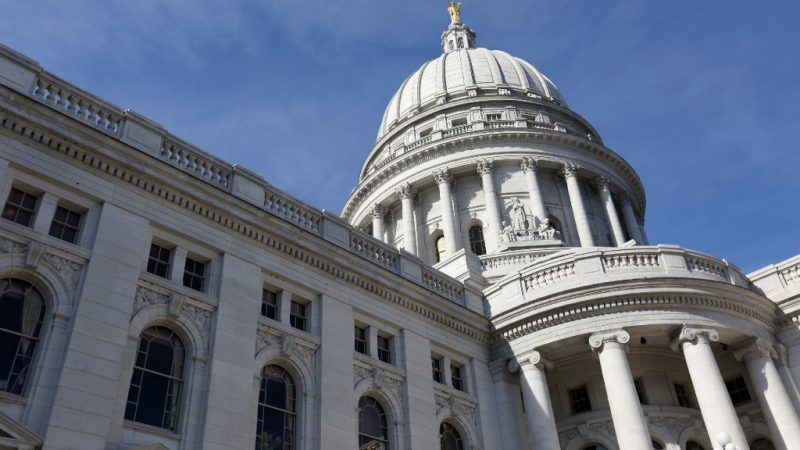Gov. Tony Evers and AG Josh Kaul announced a $1.5 million expansion of treatment and diversion options for non-violent offenders the guv said “moves our state closer to a more compassionate and common-sense approach to criminal justice.”
At a Capitol news conference Monday, Kaul touted the treatment and diversion expansion as “one key component of our three core parts of our response to the opioid epidemic.” The other two: lawsuits against Purdue Pharma entities; and education to prevent opioid addiction.
He said the move was made “interest of fairness,” noting such programs allowed those struggling with addiction and mental illness to receive “an outcome that allows them to return to their lives through treatment or through alternative programming rather than ending up in prison.”
Added Kaul: “It’s also a better outcome for public safety because if we continue the cycle of having people incarcerated, but not addressing the underlying issues that lead to that incarceration, the cycle of crime and incarceration that’s related to substance abuse addiction is going to continue.”
>> WisPolitics is now on the State Affairs network. Get custom keyword notifications, bill tracking and all WisPolitics content. Get the app or access via desktop.
Both Kaul and Evers also touted the programs as win-wins for the state financially, with the guv highlighting a UW study that found every $1 spent on the programs saved the state $2 on its criminal justice system.
“These treatment programs can save lives, but they also can open the door for future opportunities and success stories for those who are gripped by addiction,” Evers said. “These are great bipartisan steps forward to tackle the opioid and meth epidemics we’re seeing in our communities across the great state of Wisconsin.”
In a statement, JFC Co-Chair Rep. John Nygren, R-Marinette, praised treatment and diversion programs as “effective” but attributed the funding bump to “Republican action in the state budget.”
“These additional dollars will go a long way in helping allow more individuals to begin their path to recovery,” he said.
A spokesman for JFC Co-Chair Sen. Alberta Darling, R-River Hills, highlighted her support for the measure “in the budget and the last few budgets, bringing the investment to around $13 million.”
“It’s good to see the Governor supporting TAD funding,” said spokesman Bob Delaporte. “It’s a key component in getting the help they need and making our roads safer along with tougher drunk driving laws.”
Delaporte added he hoped Evers would sign a bill spearheaded by Darling and Rep. Jim Ott, R-Mequon, that would create a mandatory minimum sentence for OWI homicide. That bill was sent to Evers’ desk last Thursday.
Using funds made available in the state budget, three counties and the Ho-Chunk Nation will establish special courts while seven other counties will expand related programs.
Door and Shawano counties will receive over $140,000 and $107,000 respectively for adult drug courts, Lafayette County will be awarded more than $118,000 for an OWI court and the Ho-Chunk Nations will receive $70,000 to support a healing and wellness court. The three counties and one tribe will receive the funding in each year of the biennium.
Seven other counties will receive state dollars in each year of the biennium to expand existing programs, including:
*Adams County, which was awarded just over $21,000 to fund a peer support specialist and a volunteer transportation service for participants;
*Buffalo and Pepin counties, which were awarded more than $13,000 total for a shared program to transport participants to treatment;
*Marinette County, which will receive more than $78,000 to fund a new case manager position to increase program capacity and address the waitlists for its adult drug court;
*Monroe County, which was awarded over $57,000 to add a mental health provider to its adult drug and OWI courts;
*Portage County, which will get more than $76,000 to support a case manager to up capacity of its diversion program;
*and Polk County, which was awarded more than $83,000 to add a case manager position and implement a new diversion program.
In his budget request, Evers called for $2 million in GPR across the biennium for such programs. That request, which was signed off on by the GOP-controlled Joint Finance Committee, replaced $500,000 in program revenue with equivalent general-purpose revenue, included $500,000 in GPR to expand existing programs and added $1 million in GPR for new programs.
Monday’s announcement will use up all $1.5 million new dollars allocated in the budget toward new and existing programs, while the funds converted from program revenue to GPR will go toward five-year programs that received one-time funding in the last budget cycle.
See the Nygren statement:
https://www.wispolitics.com/



